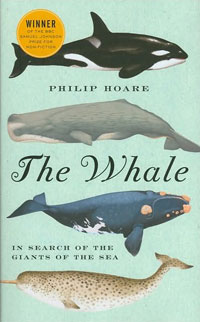Call Him Ishmael

Of our planet’s largest species I understand why the whale receives more attention than the elephant. The Megaptera Novaeangliae, after all, has Herman Melville to once and forever create a metaphor and narrative to enchant homo sapiens while we busily eradicate big mammals from our ecosphere. Pachyderms have no such chronicler. Too bad—personally I find elephants more attractive, and from what little I know, Loxodonta Africana are far more admirable—reportedly they care about each other—a fine example for us upright mammals
British writer Philip Hoare has had a life-long interest in whales—not to mention Herman Melville’s magnum opus—and thus has written prize-winning The Whale (Ecco) in which he passes on more information than you ever wanted about these oceanic behemoths. For instance, it was in WW II that in being mistaken for enemy submarines whales were bombed and had their numbers seriously reduced.
Hoare visits various watery habitats and the whaling ports that have visited so much suffering on the pelagic species. Being more a writer than naturalist, Hoare is not content to simply render a biological narrative, but extends himself to the whale’s place in human cultures. In his native land, The Whale was described as:
Moby Dick
Indeed, something for everyone.
